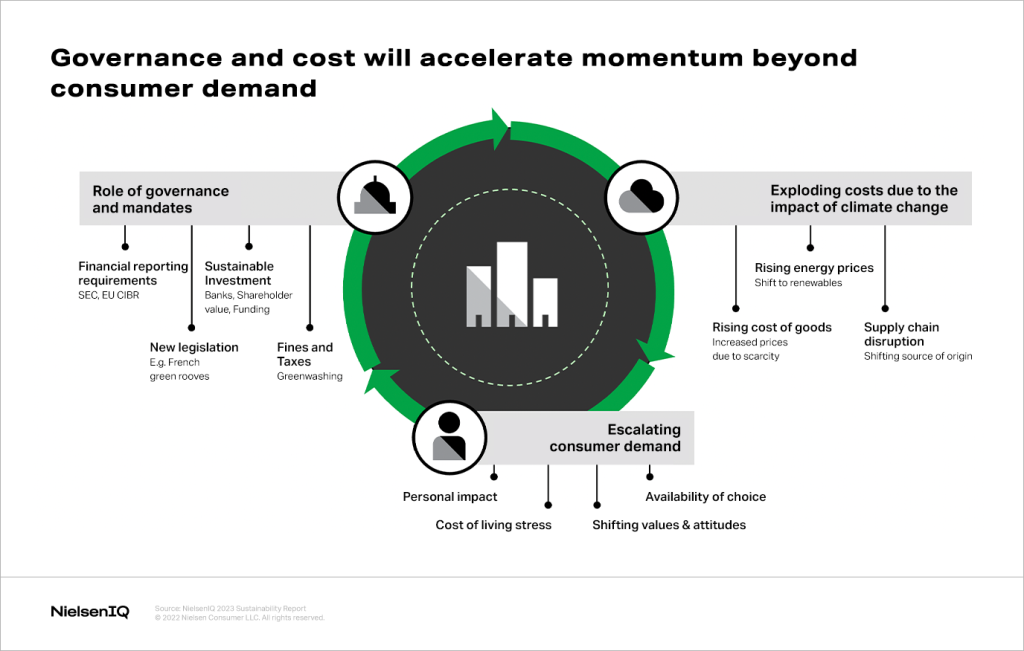Drivers of change in sustainability are shifting
Positive consumer sentiment toward sustainability has been growing for more than a decade, but the impact of purchasing preferences has yet to inspire a green revolution within the retail industry.
Two rapidly emerging drivers of change—governance and cost—are about to change all that. They will force manufacturers, brands, and retailers to transform and commit to real sustainable business models within the next five years if they want to mitigate short- and long-term risk.
Extreme weather events and the impact of the changing climate have created a business ecosystem where existing business models will be challenged. Stricter governance and mandates will propel the shift to more sustainable business models more quickly and purposefully than growing consumer sentiment has been able to.
To succeed, businesses will need to balance and react to these drivers with authentic action in an environment of unparalleled scrutiny.

Regulatory mandates will become more stringent
Consumers want governments to take a more proactive role in driving the sustainability agenda with manufacturers, brands, and retailers—helping to simplify processes like recycling as well as offering greater incentives and mandates for businesses to make meaningful change. Additionally, several countries throughout Europe and U.S. states are leading the way and implementing sets of sustainability mandates that will make it compulsory, not voluntary, for large companies and organizations to deliver validated sustainability action.
Around the world, a variety of frameworks and regulations have been put in place by governments to attempt to enforce climate action. Governance and regulations are most commonly seen in the form of legislation that is intended to curb the most damaging actions. Regulatory organizations are put in place that monitor the sustainable progress of companies and create transparency on supply chains, sourcing, and sustainable product claim origins.
To be truly impactful, this approach must include the regulation of most industries. For example, even the financial services industry is undergoing a transformation as companies are challenged to show how their investments impact the planet. Investor groups are often now required to disclose information such as the greenhouse gas emissions associated with their portfolio investments.
A growing focus of regulation that is impacting almost all industries surrounds the notion of “greenwashing”—when a company purposely makes misleading sustainable claims or overstates progress against stated goals.
Organizations accused of greenwashing are more likely to be subject to scrutiny that could impact their reputations and their bottom lines. The requirements will become more demanding, and regulators have clearly shown through recent rounds of greenwashing cases and fines that they intend to police this space and force action.

“Over the last few years, a number of companies have been making the right signals and offering an increased number of products with environmental claims. However, we are entering a new era of regulatory oversight and consumer skepticism where those claims will be scrutinized and challenged, and if companies are not transparent, or found to have overclaimed sustainability credentials—there will be negative consequences. With 77% of respondents telling us they would stop buying products from a company that had been found guilty of greenwashing, a brand could face unprecedented impacts to their bottom lines—not only from loss in consumer trust but via fines or potential deletion from retailer shelves. We are entering a new era of transparency where companies will need to recalibrate their pack and brand communications and ensure that any claims made are accurate, transparent and can be validated, or else face both the financial and consumer repercussions.”
Nicole Corbett, Vice President of Global Thought Leadership at NielsenIQ
The bottom line of the changing climate
The other significant driver behind sustainability momentum is the very real financial impact that climate change is having on companies existing business models. The pandemic-influenced shortages of the last two years has proven that globalized supply chains are vulnerable and can break down quickly when impacted.
The way products have historically been sourced, produced, and sold cannot be relied upon when natural disasters become more frequent. An array of floods, fires, and droughts have impacted agriculture around the world, which has led to increased prices due to scarcity.
Proactive companies are planning ahead to mitigate climate risk by looking at alternative agricultural practices; renewable energy; lab-grown alternatives; new supply routes and sources of origin to remove risk from their existing business models. Companies that are unable to insulate themselves from the associated risks will have to combat higher cost of goods, insurance costs, and potential trade restrictions if they are unable to meet growing calls for a more sustainable offering. This has the potential to impact accessibility, supply, and consumer backlash when viewed as unreliable.

The intersection of responsibility and expectations
Consumer demand continues to put the onus on brands and governments to make meaningful change. When asked in the NielsenIQ 2023 Sustainability Report who was most responsible for making progress on sustainability, a greater percentage of respondents ranked brands (46%) and local governments (40%) ahead of consumers (37%).
Furthermore, shoppers’ sense of urgency around the changing climate is rising, with 69% saying that over the last two years sustainability has become more important to them. An increased awareness of climate change and the direct impact it is or may have on their personal well-being have been the two main driving factors of this change.
Why sustainability is important to consumers
Increased awareness

- 54% see the impact of climate change in the news all the time
- 48% say they are more informed about climate change and sustainability
Personal impact

- 47% feel their health and/or safety could be impacted by climate change
- 30% have been personally impacted by extreme weather events or climate change
Consumers are motivated by impacts that can help the world and help them save
Consumers take action
- With only one in 20 respondents indicating that they take no actions to live sustainably
When shopping
- 49% say they bring reusable bags
- 47% only buy what they need, in an effort to avoid waste
At home
- 45% say they minimize their electricity usage
- 45% consciously separate garbage for recycling
Roadblocks to sustainable consumption
Consumers want to be part of the solution but report some shared roadblocks to sustainable consumption:
- 41% saying that sustainable products are too expensive
- 35% finding limited sustainable product availability in stores
Brands have a unique opportunity to be viewed as partners in the fight for sustainability if they can help them overcome these obstacles at the point of purchase. In the current inflationary environment, brands should take note of the drivers of behaviors for consumers that are clearly impacted by the positive impact on reduced costs, as well as the sustainable impact.

“Consumers are looking for retailers and brands to help them,” says Corbett. “81% of respondents globally are likely to choose a retailer that incentivizes or rewards sustainable choices and 79% are likely choose a retailer if they offered a wider assortment of sustainable options in store, so there are real impactful opportunities for retailers to deliver on consumer expectations when they make the effort. From a brand perspective, consumers want brands to help their sustainable efforts by ensuring sustainable products that are more competitively priced, that offer not just an environmental benefit but also a personal health benefit. Those that are packaged with clearer labelling are likely to stand out among competition.”
Nicole Corbett, Vice President of Global Thought Leadership at NielsenIQ
In the immediate future, these key industry groups must have a shared understanding of how they can work together to help advance their mutual objectives as well as finding ways to hold each other accountable when goals aren’t met or progress is misrepresented.
Proactively address the changing climate of sustainability
Exploding energy costs, crop failures, and supply chain disruptions that have emerged as a result of the changing climate and extreme weather events are already impacting existing business models.
While there are many companies that have set ambitious sustainability targets and some who are proactively leading the race with new and innovative changes to their day-to-day operations, the next five years will see accelerated action from the retail industry. As companies look to navigate and apply strategies to comply with mandates, and mitigate cost and risk to their business, keeping consumers close on the journey and embracing their sustainability needs will be critical to finding the green solution that we all need.




